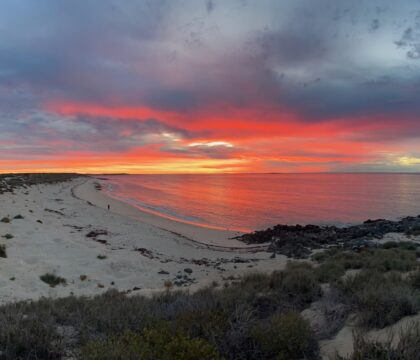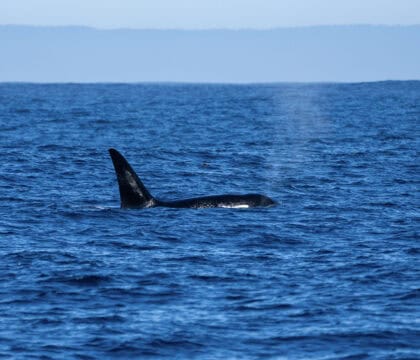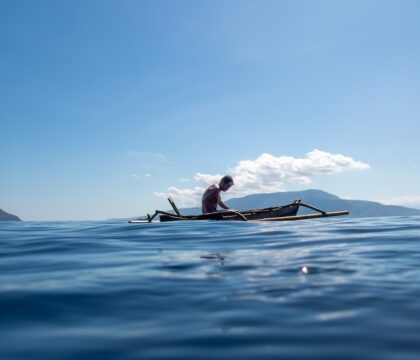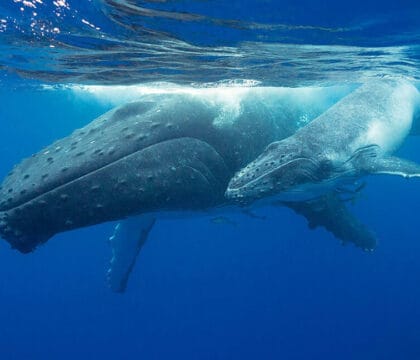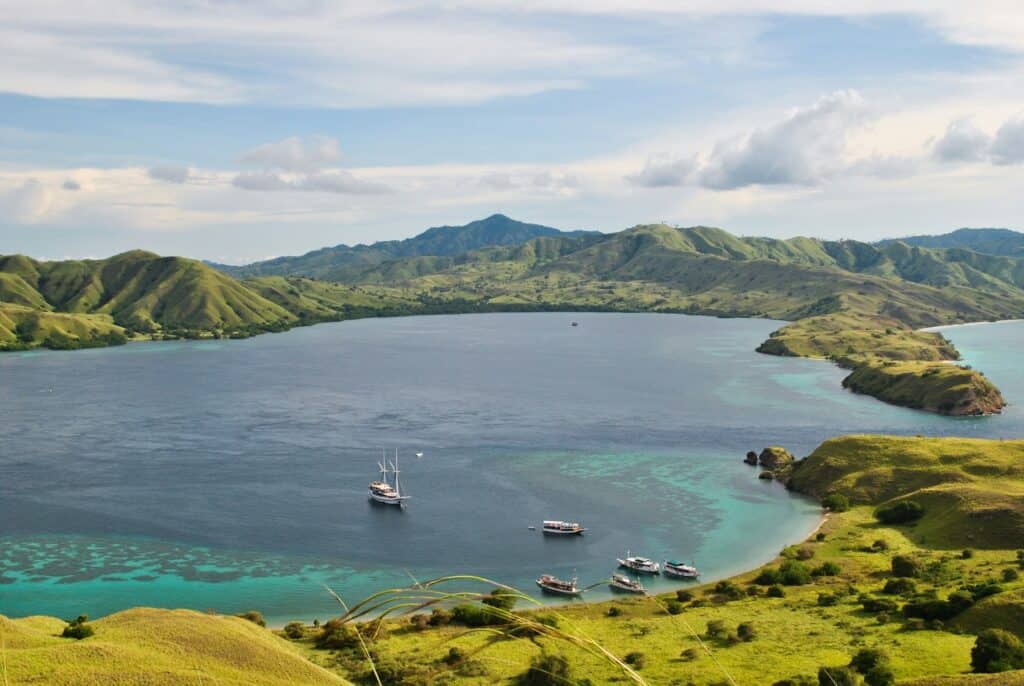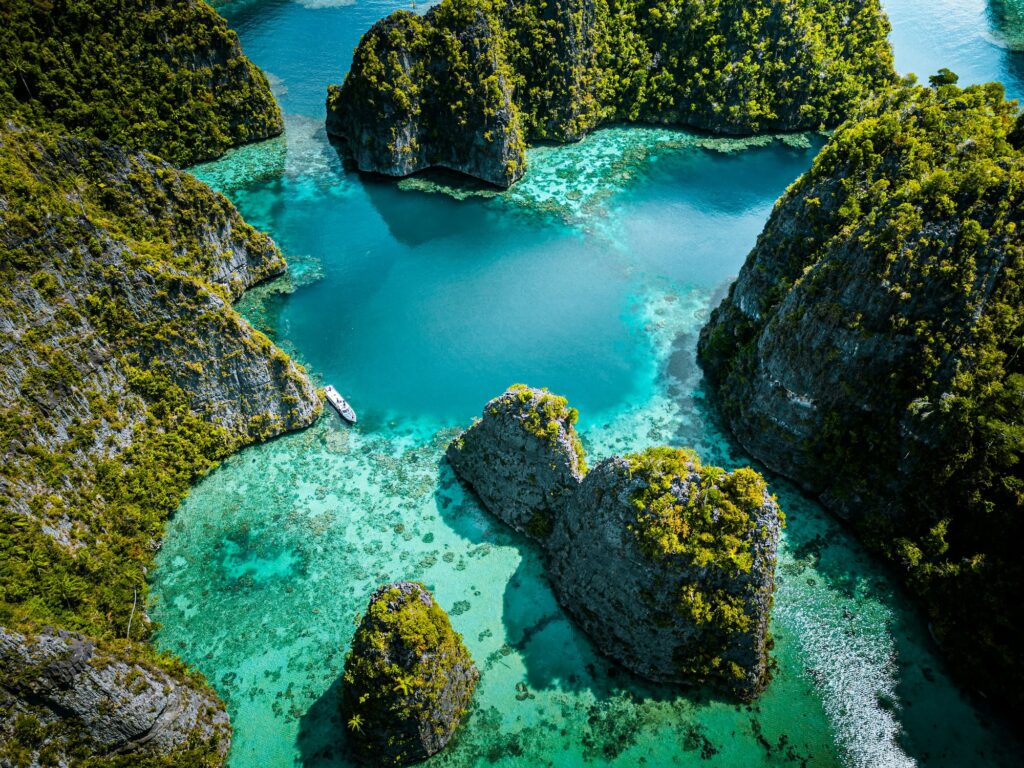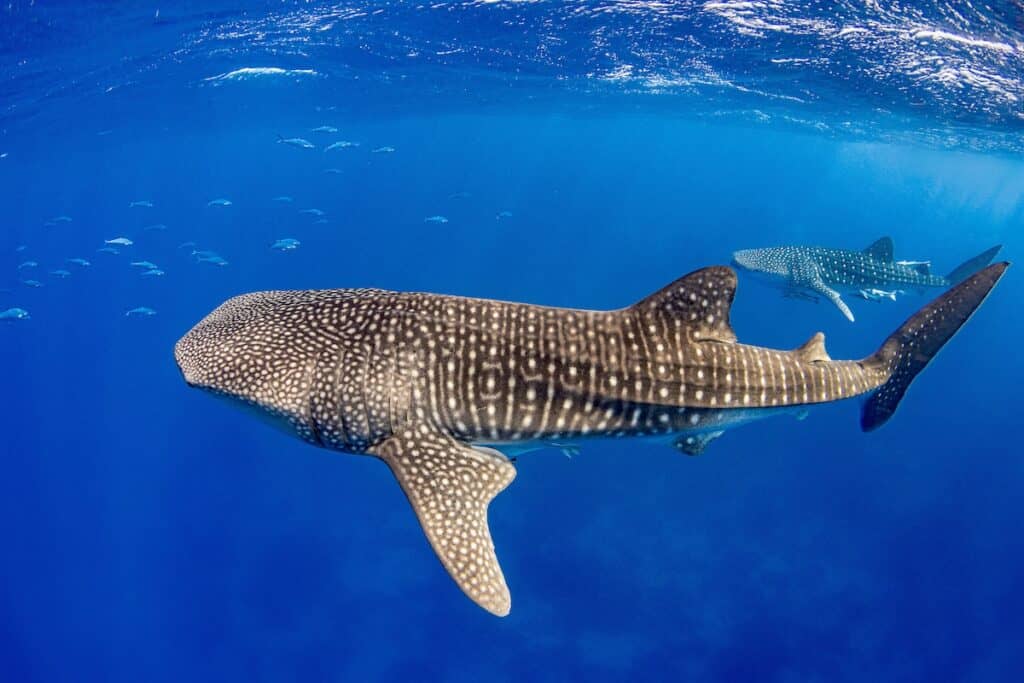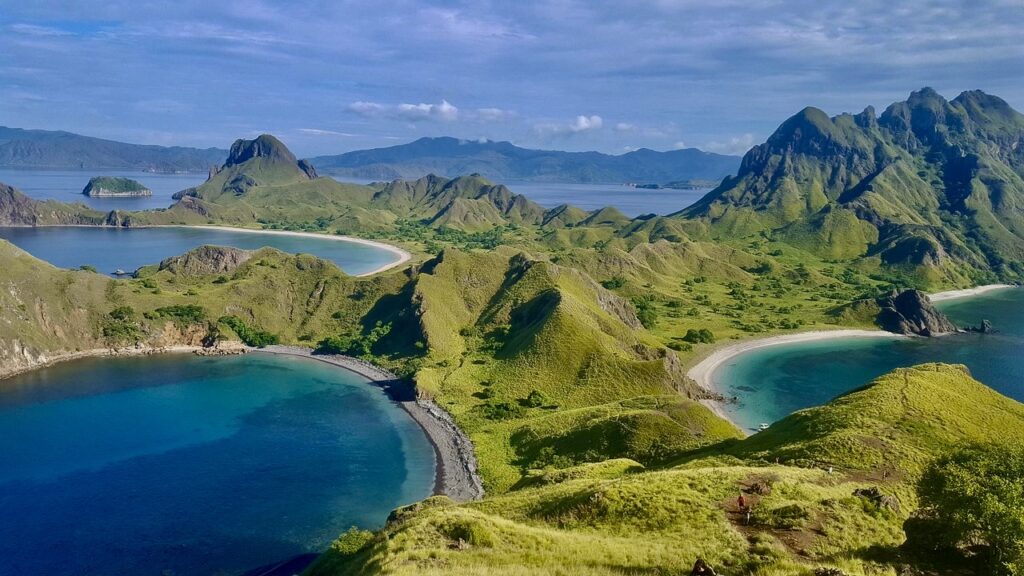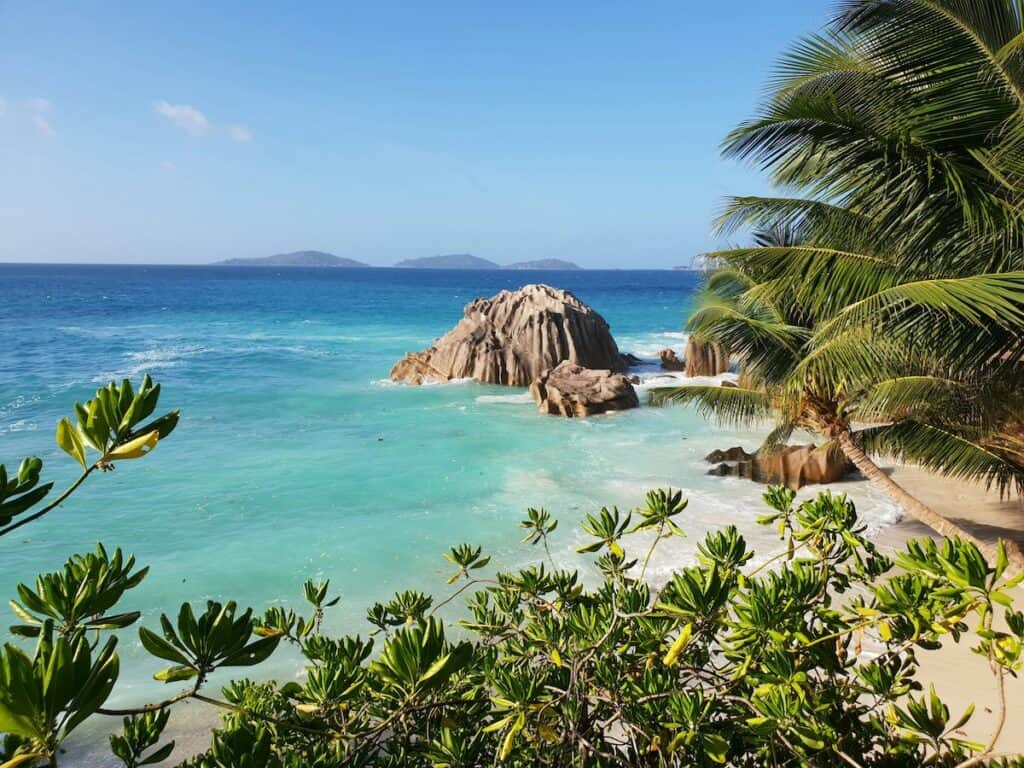June 27, 2025 • Trip Reports
A Spark in the Solomon Islands
35 years ago, Susan Forster watched a group of canoes approach her dive boat while anchored in a remote corner of the Solomon Islands. While the locals saw the boat packed with affluent divers as an opportunity to sell their wares, Susan, enamored with the dugout boats, saw a different opportunity.
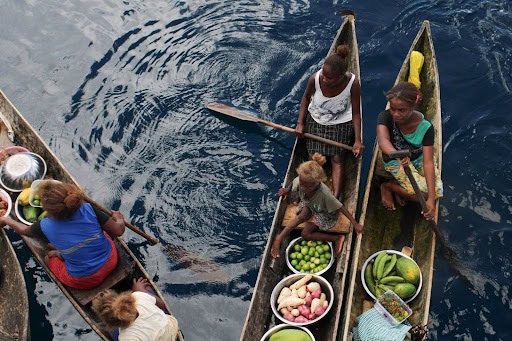
A group of Solomon Islanders from nearby villages approaches a liveaboard in dugout canoes to sell produce. © Zach Theiler
“I just thought, ‘wouldn’t it be nice to ride in that boat?’” she recalls the impulsive urge. So she quickly made friends with a charming local merchant who invited her for a ride to a beautiful nearby beach.
“We just walked along the beach holding hands.” She remembers how they immediately bonded despite their different cultures and backgrounds. “What a connection we had,” she smiles. Later that evening, under the moonlight, he picked her up in a motorized boat to take her to a nearby cove, but the boat broke down along the way, leading to lots of laughs and a memorable evening.
Reflecting on Decades of Change
Susan tells me this story 35 years later as we sit on the deck of the Bilikiki, the very same liveaboard on which she explored the Solomon Islands during her first voyage. Back then, she came to this remote country as a dive enthusiast with a newly minted scuba certification, seeking the wildest ocean adventures. Today, she returned as a seasoned traveler, curious about how this land had changed, and eager to revisit a place that held such fond memories.
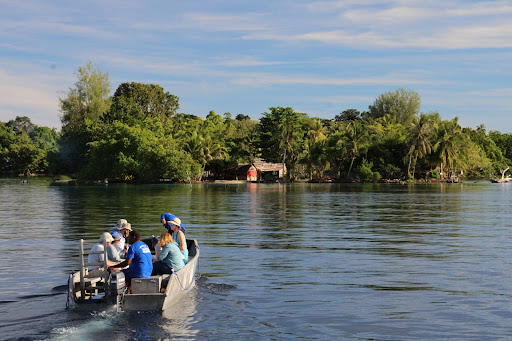
A group of Oceanic Society travelers, including Susan, embark to a local village for a cultural exchange in the remote Solomon Islands. © Zach Theiler
Much had changed in the Solomons since her last voyage to this remote corner of the world. Even here, where over half of the 992 islands are uninhabited, the corals feel the effects of climate change. But above the water, the vastness of the seascape and the sweeping vistas of mangrove-clad islands remain largely the same.
“It’s like the last quiet place in the world,” Susan tells me as we sit on the deck, with starlight our only companion. The journey had resurfaced many memories. While she never did reconnect with that merchant, she held a distant hope that she might stumble upon some other connection from her original journey. In a country with just 800,000 people, such incidents are always possible.
A Connection Rekindled by Art
A few days later, at a local market tucked under a mangrove-shrouded beach, she admired the artwork carved from obsidian, tree nuts, and ash. There, an artist tried to persuade her to buy a nusu nusu, a traditional carving mounted on a canoe, but she showed the salesman a picture of a nusu nusu she had acquired during her first visit to this country, which was now in her home in northern California.
The artist told her to show the photograph to a different woodworker at the market – a man standing under the shade of a mangrove. Surprised and confused, she followed the instruction, and when the man saw the photograph, he became teary-eyed. He told her that the nusu nusu in her home was the work of his brother, who had passed away in the years since Susan bought it 35 years ago. To this day, he could still clearly identify the artistic touch of his brother.
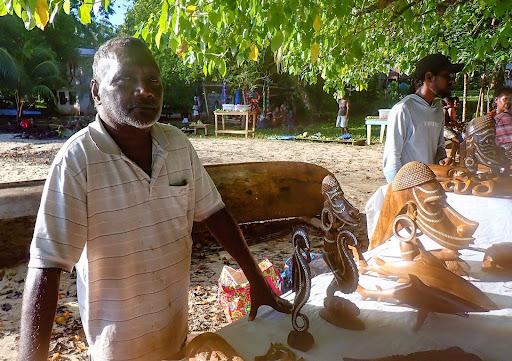
The woodworker immediately recognized the work of his brother, who carved Susan’s nusu nusu 35 years ago, and had since passed away. © Susan Forster
“Your brother’s spirit and energy are in my house, far away,” she told him, and emphasized how meaningful the artwork was to her.
How Taking Chances Shaped a Life of Travel
Today, Susan remembers how deep connections with people motivated her to travel throughout her life, which has often required her to take risks. She’s thankful that she had the “guts” to ask the young man for a canoe ride, even though many people on the boat probably thought she was crazy to paddle off into the sunset with a stranger.
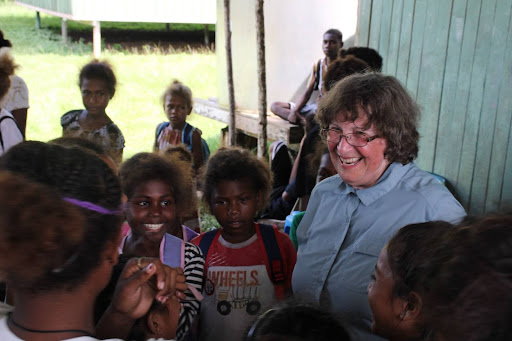
Susan visiting a local school in the Solomon Islands. © Zach Theiler
Susan is both a certified diver and a licensed pilot. She reflects on the joys of flying a small propeller airplane, the unique perspective it offers, and the dangers that come where any mistake could spell doom. Her desire to fly through the air without confines ultimately pushed her to learn how to paraglide – an experience that nearly killed her.
While charging off a cliff with her paragliding instructor in northern California, her body betrayed her. “So we’re running to the edge of the cliff, and I wanted to keep running and go, but my body said, ‘Why would you jump off a cliff?’” She laughs, despite the clear dangers of the incident. “And so I came to the edge, and I just stopped.” She and her instructor tumbled into a heap and narrowly avoided toppling over the cliff. But instead of giving up, she tried again. “The next time, I was determined.”
“My friends laugh and joke that I must have a death wish!” she jokes. But her drive to experience the world has always informed these choices, which have sometimes led her to life-changing travel experiences. “I want to be with the people. I want to experience the Earth, the world, as much as I can,” she tells me. “You shouldn’t be afraid to try unusual things for yourself.”
Finding Freedom in the Water
As we sit together reflecting on why people love to travel, Susan emphasizes that as a lifelong nature enthusiast, her travels have often brought her close to the ocean, a place that holds special, almost spiritual importance for her.
“Our body is mostly water, so when we’re in water, we have that connection … You can really lose yourself in a way that you just can’t above water,” she tells me as the ocean spans all around us and reflects the moonlit sky like a mirror. “It gets you away from your own self, gets away from the concept of self, into being merged with other things, with nature.”
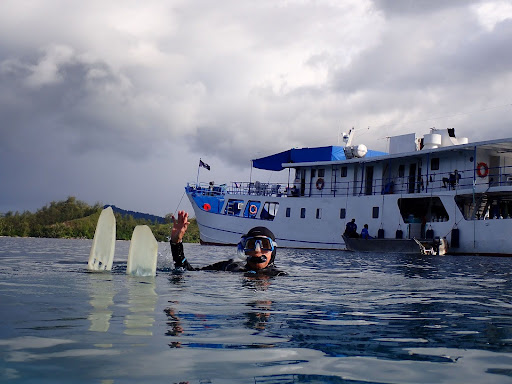
Oceanic adventures hold special importance for Susan. © Susan Forster
Few places in the world let you experience the ocean in such an intimate way as the ultra-remote Solomon Islands. During our expedition, dolphins regularly bounded towards our boat to bow-ride. Pods of pilot whales rode with us into the sunset. The corals, though damaged by the effects of climate change, showed signs in certain corners that they were recovering after record-breaking heat. Diving in the Solomon Islands, like Susan did 35 years ago, can take you close to sunken wrecks of World War II era airplanes and battle ships.
Embracing Solo Travel as a Woman
Throughout her life, Susan has often sought out solo travel opportunities – a dynamic which allowed her to make own choices, take risks on her own terms, and discover just how capable she was in unfamiliar places.
“When I travel, I want to have the freedom of choice,” she says, “I want to jump into a canoe and go for a ride if somebody asks me.” That inspiration took her to China for three weeks by herself in the 1990s, one of many solo travel adventures that brought about personal growth, quiet reflection, and connection with people she might never have met otherwise.
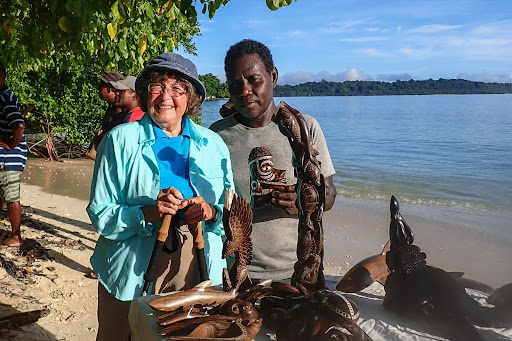
Connecting with people in new places and from different cultures is a key reason why Susan loves to travel. © Susan Forster
Today, Susan still prioritizes solo travel, but she also enjoys the comforts afforded by an organized tour and describes teaming up with an organizer and a group as a “win-win situation.” Since 2017, Susan has embarked on five small-group trips with Oceanic Society as a solo traveler.
“I don’t have to worry about the boat, right?” she laughs, “There’s always someone to chat with, but when I want to be by myself, or do something alone, I can do it easily.”
Why Now is the Time to Explore
35 years ago, exploring the Solomon Islands was Susan’s first far-flung adventure after receiving her dive certificate. Today, she looks to do trips a bit closer to her home in northern California – but she feels satisfied with how she’s explored the world.
“Go for it. I tell young girls, especially, to live now,” Susan says, “Don’t wait. Don’t wait till you make more money. Don’t wait till you have more kids. Don’t wait till you don’t have kids. Do it, because you’ve got to do it right away.”
Inspired by Susan’s story? Join our newsletter to get travel stories, expedition updates, and ocean conservation tips delivered to your inbox.

